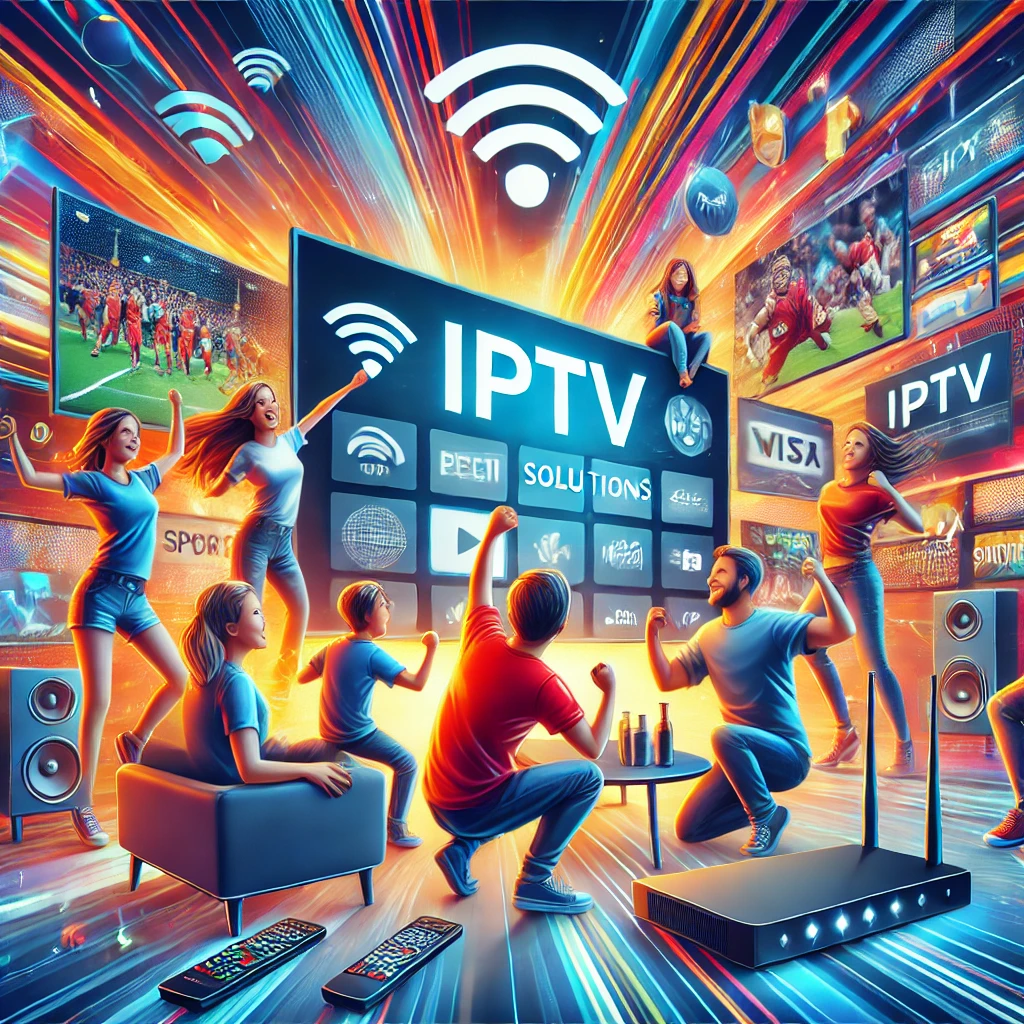Television is evolving faster than ever before, with IPTV (Internet Protocol Television) being at the forefront of this change. As traditional TV becomes less appealing in the age of on-demand entertainment, IPTV solutions are stepping in to provide users with the flexibility and range of content they crave. But what exactly is IPTV, and how can it serve as a solution for the modern viewer? In this article, we will explore the ins and outs of IPTV solutions, why they are rising in popularity, and how businesses and individuals can benefit from integrating them into their entertainment system.
What is IPTV and How Does it Work?
Understanding IPTV Technology
IPTV stands for Internet Protocol Television, a technology that delivers television content via the internet, unlike traditional broadcasting methods like satellite or cable. Essentially, IPTV converts the standard TV signal into a digital format that can be streamed over an internet connection. This means viewers can access their favorite shows and movies anytime, anywhere, using their preferred device—be it a smartphone, laptop, or smart TV.
IPTV services work by sending content through a series of servers, which is then transmitted to users through a secure internet connection. Rather than being tied to a strict schedule like traditional TV, IPTV offers the flexibility to watch live TV, recorded content, or video-on-demand (VoD) based on the user’s preference.
IPTV vs Traditional TV: The Key Differences
While traditional TV relies on broadcast signals sent over satellites, antennas, or cable systems, IPTV leverages the power of the internet. This fundamental difference has led to several advantages that IPTV holds over its traditional counterpart:
- On-demand content: IPTV allows users to watch shows and movies whenever they want, unlike traditional TV’s strict programming schedules.
- Device flexibility: With IPTV, viewers can watch content on any internet-connected device, offering much more versatility compared to traditional television.
- Interactive features: IPTV provides additional functionalities, such as pausing, rewinding, and fast-forwarding live TV, which is not possible with conventional broadcasting.
- Customized viewing: IPTV users can create their own channel lists, skip unwanted content, and get personalized recommendations.
The Benefits of IPTV Solutions for Businesses and Individuals
Why IPTV is the Preferred Choice for Modern Viewers
IPTV solutions are becoming the go-to option for a variety of users due to their numerous benefits. First and foremost, IPTV offers a greater level of control over how content is consumed. Users are no longer limited to what’s currently airing on traditional TV channels. Instead, they have access to an extensive library of shows, movies, and live streams at their fingertips.
Additionally, IPTV’s ability to provide high-quality streaming at a fraction of the cost of cable or satellite services makes it even more appealing. This solution is especially beneficial for cord-cutters—people looking to reduce or eliminate their reliance on traditional television services.
Cost-Effectiveness and Flexibility of IPTV
IPTV offers an affordable solution for both businesses and individual consumers. By using an internet connection, IPTV eliminates the need for expensive infrastructure like satellite dishes or cable lines. This makes it possible for businesses to save on operational costs while providing their customers or employees with a wide range of viewing options.
For individual users, IPTV subscriptions are often much cheaper than traditional cable services, especially when factoring in the additional features such as on-demand content and multi-device support. The flexibility to access content across various devices further adds to its value proposition.
Types of IPTV Solutions Available
Live IPTV Streaming Services
Live IPTV streaming is similar to traditional TV broadcasts in that it allows users to watch live programs as they air. However, the key difference is that the content is streamed over the internet rather than broadcasted through a satellite or cable connection. This type of IPTV solution is particularly popular for live sports, news, and events.
On-Demand IPTV Services
On-demand IPTV services are exactly what they sound like—video content that can be watched whenever the user chooses. Instead of being tied to a broadcast schedule, users can browse a library of shows, movies, and other content, selecting what they want to watch at any time. On-demand IPTV is ideal for binge-watchers and those who prefer flexibility in their viewing habits.
Time-Shifted IPTV
Time-shifted IPTV allows users to watch previously broadcasted content at a more convenient time. This includes features such as catch-up TV, which lets users watch shows that aired hours or even days earlier. Time-shifted IPTV is a fantastic option for viewers who want to avoid missing out on their favorite programs but can’t always be available when they first air.
Choosing the Right IPTV Solution for Your Needs
Factors to Consider: Quality, Cost, and Features
When selecting an IPTV solution, several factors need to be considered to ensure you get the best experience possible:
- Content library: Ensure the service offers a diverse range of channels and on-demand content that meets your needs.
- Streaming quality: Look for services that offer high-definition or even 4K quality, particularly if you have a fast internet connection.
- Price: Compare different IPTV providers to find a solution that fits your budget without compromising on features.
- Device compatibility: Make sure the IPTV service supports the devices you intend to use, whether it’s a smartphone, smart TV, or PC.
- User interface: The platform should be easy to navigate, with intuitive features such as search functions, favorites lists, and live TV guides.
Comparing Popular IPTV Providers
There are many IPTV providers on the market, each offering unique features and pricing models. Some of the most popular options include:
- Sling TV: Known for its flexibility and range of add-ons, Sling TV is an excellent choice for users who want a customized experience.
- Hulu + Live TV: A combination of live TV and on-demand streaming, this service is ideal for users looking to cut the cord without sacrificing content variety.
- AT&T TV Now: A higher-end option, AT&T TV Now provides a wide range of live channels along with HBO Max and other premium services.
How to Set Up an IPTV Solution
Step-by-Step Guide to IPTV Installation
Setting up an IPTV solution is relatively straightforward, but there are a few steps to follow to ensure smooth installation:
- Choose an IPTV service provider and sign up for a subscription.
- Download the IPTV app on your preferred device.
- Log in with your credentials provided by the IPTV service.
- Set up the app to match your viewing preferences, such as selecting favorite channels or organizing the content layout.
- Ensure your internet connection is fast and stable for uninterrupted streaming.
Hardware and Software Requirements for IPTV Setup
For a seamless IPTV experience, certain hardware and software requirements must be met. These include:
- A stable internet connection with a minimum speed of 10 Mbps for HD streaming and higher for 4K.
- A device that supports IPTV apps such as a smart TV, Android box, or even a gaming console.
- The IPTV app, which can be downloaded from the app store on your device or installed manually in some cases.
- An IPTV subscription that provides access to your chosen content.
Common Challenges and How to Overcome Them
Buffering and Connection Issues
One of the most common issues users face with IPTV is buffering or lagging. This can happen due to a poor internet connection or network congestion. To resolve this issue:
- Ensure your internet speed meets the minimum requirement for IPTV streaming.
- Use a wired connection (Ethernet) instead of Wi-Fi, which can be unstable at times.
- Close background apps or devices that may be hogging bandwidth.
Legal Considerations: Is IPTV Safe and Legal?
The legality of IPTV services varies depending on the region and the specific service you are using. While many IPTV solutions are legal, some services stream pirated content, which can land users in legal trouble. It’s essential to do thorough research on the IPTV provider you choose and ensure they offer licensed content. Using a VPN can also add a layer of protection to your streaming experience.
The Future of IPTV Solutions
Technological Advancements in IPTV
As technology continues to advance, so will the capabilities of IPTV solutions. We can expect to see more immersive experiences, such as 4K and 8K streaming, better user interfaces, and the integration of virtual reality (VR) and augmented reality (AR) elements into IPTV platforms.
Emerging Trends in IPTV Streaming
Personalization is a key trend in IPTV’s future, with AI-powered recommendations and customizable interfaces becoming more prevalent. We may also see more IPTV services offering exclusive content, similar to what we see with popular VoD platforms like Netflix and Hulu.
Conclusion: Is IPTV the Right Solution for You?
IPTV offers an incredible solution for both businesses and individuals looking to enhance their entertainment experience. With its flexibility, affordability, and growing content options, it’s no wonder that IPTV solutions are quickly gaining popularity. Whether you’re looking for live TV, on-demand content, or the latest technology in streaming, IPTV is likely to have something that fits your needs.
FAQs About IPTV Solutions
What Devices Can I Use to Access IPTV?
IPTV can be accessed on a wide variety of devices, including smartphones, tablets, smart TVs, streaming devices like Roku or Amazon Fire Stick, and even gaming consoles like Xbox and PlayStation.
How Much Bandwidth Does IPTV Require?
For standard definition (SD) content, a minimum of 3-4 Mbps is recommended. For HD content, you’ll need at least 10 Mbps, and for 4K streaming, a speed of 25 Mbps or higher is preferred.
Are IPTV Services Legal Worldwide?
The legality of IPTV varies from country to country. Many IPTV services are legal, but some stream content without the proper licenses. It’s essential to verify the legality of the service in your region.
Can I Record Shows Using IPTV?
Yes, many IPTV providers offer the option to record live shows, movies, or other content using cloud storage or built-in DVR functionality. This feature is usually available for an additional cost.
How Do I Troubleshoot Common IPTV Issues?
Common IPTV issues include buffering, freezing, or connection problems. To troubleshoot, you can try restarting your device, checking your internet connection, or switching to a wired connection for more stability.



